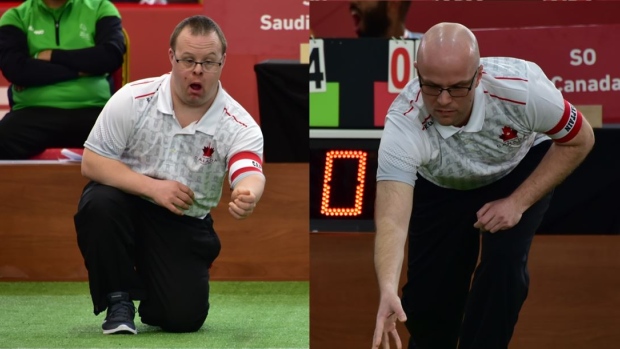Mar 18, 2019
MacDonald, Bialk do Canada proud at Special Olympics
The Special Olympics World Games brings out ‘the fierce’ in the competitors. Regardless of eventual outcome, the athletes are in it to win it. It's no different for Neil MacDonald and Philip Bialk, writes Pj Kwong.

The Special Olympics World Games brings out ‘the fierce’ in the competitors. Regardless of eventual outcome, the athletes are in it to win it.
Neil MacDonald , Special Olympics Team Canada Bocce athlete, was disappointed to finish in fourth place only to be reminded by his mom – permanent supporter and sometimes coach Sandra St. Louis – that he had lost his final two games to the eventual gold and silver medallists by one ball in each case. A pretty remarkable record to say the least.
“I love the sport. It’s challenging,” said MacDonald.
MacDonald’s journey to bocce is part of a larger one in Special Olympic sport. As a young child, his parents, Murray MacDonald and St. Louis wanted their son to have as full a life as possible and considered sport to be the great social leveller. It started with soccer.
“Once Neil was on the field with the other kids running, he became just another kid,” said St. Louis, “and the older he became, the more important that (social leveller) became.”
MacDonald’s parents have been involved as coaches in various sports along the way at the provincial and national levels. Neil MacDonald curls and plays baseball in a league with his dad, Murray, in addition to Special Olympics sports, and has competed in skiing, bocce, five-pin bowling and floor hockey.
SO Team Canada Bocce coach David Wilkinson has a short and simple approach to coaching: “We do our best and have fun.” Life lessons are part of the process. According to Wilkinson, “I want the athletes to enjoy the whole experience over here; win or lose. No doubt walking into the opening ceremonies with their teammates to 40,000 cheering fans has to be one of the highlights of the Games.”
Back on the field of play, Wilkinson acknowledged that there is a lot of strategy in bocce not to mention precision shooting in trying to get as many balls as close to the pallina (white ball) as possible. The sport is reminiscent a little of curling. “Not being able to coach during the game and having to sit on the sidelines and just watch and not speak to your athletes during the games was something new to get used to,” said Wilkinson.
There is no end to the preparation of the athletes.
“We follow the long-term athlete development model, have training camps to be ready physically, emotionally and mentally for the experience here in Abu Dhabi,” said Special Olympics Canada chair Mark Tewksbury.
Finding satisfaction and motivation in competition is as individual as are the athletes. Winnipeg native Philip Bialk also competed in bocce. After a three-day life-skills camp back at home in Winnipeg, Bialk decided on the final day that bocce was the one new thing he would try. He had a natural knack for the sport, according to Wilkinson, and here he is at the World Games.
Bialk and MacDonald are Abu Dhabi roommates, teammates and friends but offer very different views of their own competition styles.
The best part for Bialk? “I got to play against two Commonwealth countries: Aruba and St. Vincent and the Grenadines.” Bialk’s experience at the Special Olympics World Games can be summed up in one word: “Unity”.
For MacDonald, his credo is ‘reach for the stars’, which he says he came to after watching the ‘A Knight’s Tale’ movie. It makes him “want to win anyway.”
As I said, motivation takes many forms.
The Special Olympics World Games take place in Abu Dhabi, UAE from March 14 – 21, 2019. For complete details, visit www.abudhabi2019.org , www.tsn.ca and www.specialolympics.ca/games-events/go-canada-go .
